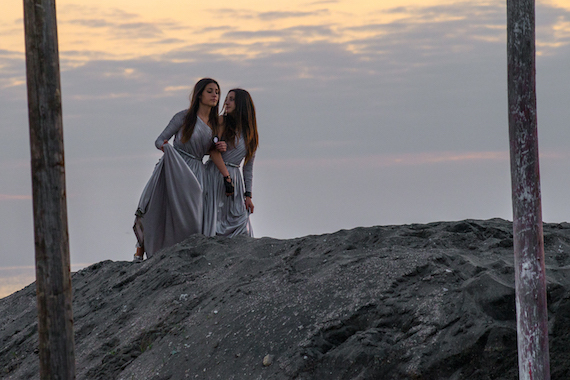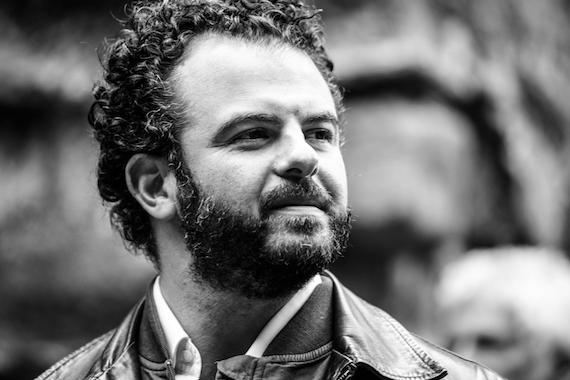The opening shots of Edoardo de Angelis' Indivisible set the tone for the poetic fairy tale he's about to tell. Three girls are coming back from a night out, walking on the beach at dawn in skimpy outfits and melting makeup, yet they appear more like mermaids stepping out of the ocean than teenagers on a walk of shame. After De Angelis makes it clear that their presence is only to set the tone for his magnificently private reality film to come, Indivisible takes off as a cinematic poem. A Southern Italian, modern day, feminine ode to the languid tones of The Love Song of J. Alfred Prufrock that picks up where T. S. Eliot left us off. Perhaps. Just as well, since Eliot himself borrowed some from our Dante's verses for his own work of art.
But I promise that's it of quoting lofty from me. Indivisible owes its great beauty and charm to its simple message, which stands at the core of every shot, every bit of dialogue, every moment of the film, from beginning to end. This idea that we carry our loved ones with us wherever we go, which of course De Angelis takes to the absurd with the story of two siamese twins named Viola and Daisy who yearn to be separated, yet love each other unconditionally. But being tied by love and discovering the pain of separation are notions we are all familiar with, even if at times we wish we were not. How often have we thought of lovers far away or family members in distant lands and wished we could be there by their sides, if only for a minute?
It's this concept that I was glad to find resonated deep within the answers that De Angelis provided me with, during our interview in London. Indivisible, after having premiered in Venice and played in Toronto, screened there as part of the Italian Cinema at the BFI London Film Festival program, a fantastic showcase of five films from contemporary Italian filmmakers that included Marco Danieli's Worldly Girl and Marco Giovannesi's Fiore.
Indivisible owes its belief factor, even when faced with what could seem absurd, to the perfectly constructed story but also its two protagonists, real life twins (though not siamese) Angela and Marianna Fontana. The not-yet-twenty year old sisters come from Casapesenna, a small town not far from where De Angelis shot his film. It is also an area well known to be under the Casalesi clan's grip, the heart of Camorra land, as De Angelis described to me. A land at once helped and destroyed by the Camorra.
On a more, perhaps "political" note, Oscar winning Italian filmmakers Paolo Sorrentino admitted recently that Indivisible should have been the Foreign Language Italian entry to the Academy Awards this year, instead of the documentary Fuocoammare -- which could have competed in the documentary section instead. It certainly would have raised the stakes for Italian cinema, this courageous choice proposed by Sorrentino, while also multiplying the country's chances of winning the golden statuette. But we'll leave that for a different time, another piece.
Catching up with De Angelis turned out to be a highlight of my festival. We sat quietly on the mezzanine floor of the May Fair Hotel, and talked in a frank, easy Italian, that I've taken the liberty to translate myself. I may not always have gotten the perfect words but I tried to do right to the feelings that his answers carried. And I hope I've done justice to the filmmaker's kind tone, his sultry, calm voice with just a hint of the loveliest Neapolitan accent, which always makes me think of my mother's homeland.
What was the inspiration for this film? It's such a particular story, so true on the one side and yet almost like a fable.
Edoardo De Angelis: The challenge was to take what was apparently a "high-concept", and tell it in a profound, deep way. I wanted to make a film about separation, a story of formation and that would describe how, in order to grow at times we must get hurt, we hurt ourselves. To separate from a seemingly indivisible bond, but at times also split from a part of ourselves. What interested me was the theme of separation -- not only physical but also mental. The image of the two siamese twins is perfect for telling through the physical, the anguish of an internal separation.
Were the siamese twins the first idea for being able to tell this pain?
De Angelis: It wasn't. But it was a bit about me thinking of this theme, and then I met the screenwriter Nicola Guaglianone who suggested two siamese twins, singers in Naples, who provide a living for their entire family with their singing. And this image seemed perfect for telling this theme. The decisive factor came when I saw an old portrait of the twins Daisy and Violet Hilton -- who give names to my characters -- and there were these two girls conjoined at the hip, pretty, and at the same time a bit grotesque. And that blend of attraction and repulsion really seemed to me like a mirror on our entire human existence.
Your film is poetic. There is so little poetry in our lives these days and even harder to find poetry in movies perhaps. Do you think cinema can help us understand "the Other", what is different from us?
De Angelis: I think that cinema creates order out of the chaos of the world. To do it, it uses synthesized images. Every frame to me represents a synthesis of the world. With all those opposing forces of good and evil, the beautiful and the ugly, of the old and the new. I didn't want to tell this story to an Italian, but rather I wanted to tell it to a human being. Every human being has experienced, or will experience separation. Every human being knows that in order to grow, they will have to suffer. They have to pass through an arch of transformation. Animals know it, and yet human beings at times forget this. They need to re-learn it, this concept. Why do they forget it? Because it brings pain -- there is no growth without pain.
There is a beautiful quote by Florentine writer Vasco Pratolini, about our first conscious realization being determined by pain.
De Angelis: I believe so. I also think it is a simple way to talk about life and I wanted a simple story, I didn't want to tell a complex tale. Because I didn't want the audience to get distracted following the plot.
It's almost like a theater play, the way you show your characters. So intimate, so up close. There are moments I almost felt like a peeping tom, peering into something very private.
De Angelis: I wanted to penetrate into the private. That's why I used this obscure language. The girls don't even speak a Neapolitan dialect, it's a mysterious language from a little village near Caserta. I wanted them to be incomprehensible to others. Even I had a hard time at first in understanding them. But I discovered that when they used that language they could communicated feelings in a very immediate way. Without any filters, and so I understood that it needed to be their language. Yes, you can read the subtitles, but also if you don't, their language comes as music and it cuts straight to the heart. It's a language of the deepest sentiments and ancestral times. And it's also different from the language used by those around them. It's almost masonic. They are jealous of their world and they guard it through this secret language. I don't know if this is a film that has poetry, I love hearing it from you. But I wanted to find a simple way, the clearest way -- the undeniable sign. That's the poetry. An undeniable sign.
But all human beings, we have those signs, no?
De Angelis: Yeah and that is my field of research. The human being. We are children of a cinema tradition that is part of our DNA, even theatrical, particularly in Naples. From Eduardo De Filippo, we have inherited everything. The characters, their morals, their desire to be middle class. Their post-war stories, this was an Italy that searched for peace, and tranquillity. And it found it within the four walls of our homes, where perhaps most treachery hid.
Today Italy is living a strange sort of post-cold-war. We come from 20 years of cultural ruins. The critical spirit of the Italian citizen has been completely hollowed out. The worst thing to emerge of the past twenty years is that the Italian citizen has lost all kinds of ethical reference. Ethics have been turned upside down. The respect for family, respect of marriage, respect for honesty, being honest with ourselves and other human beings. This was made completely relative. These days we can try to build back honesty, ethics, but to do it we must start from the very foundation.
Otherwise we just survive, we don't live fully.
De Angelis: There is danger related to this "mediocracy". Everything that is mediocre is accepted. Everything that shines of its own light gets rejected. This is a grave danger for a country because the country slowly dims [dumbs] down. And stops looking to the future. That's why I love that the two girls run away from the spotlights of a permanent reality show where nothing is showcased. And they run away from this nothing because they want to prove themselves. With the danger of remaining alone, or dying, of the cold that comes from stepping out of the spotlight. But they want to risk that, because they want to live.
In Italy, there is no longer the bourgeois ideal, rather a jam of fake ideals, fake religions and fake beliefs. Everything that is rounded off is accepted, what is blunt, sharp is not OK. I'm tired of this moral relativism. I want to deal with people who have very precise ethics, I want to know what it means to respect others' words, and other people. I want to know what it means to respect our parents, our friends, our brothers, our wives. All this must be regulated by a strong ethic. These girls teach me that there is a new era, of a moral that is clean and honest.
How did you find the girls, your actresses?
De Angelis: I already knew them from a previous casting call. And then when we auditioned for this film I remembered them. They have performed in some talent shows in Italy, as singers. But they are traveling down a really interesting road. They've done TV when they were younger, then they debuted in a film, and now they've gone back to the Conservatory to study. It's important to me that they build their career on studies, not just opportunities. Opportunities can be well exploited only if one is well prepared.
How would you describe yourself to someone who doesn't know you?
De Angelis: A normal person.


